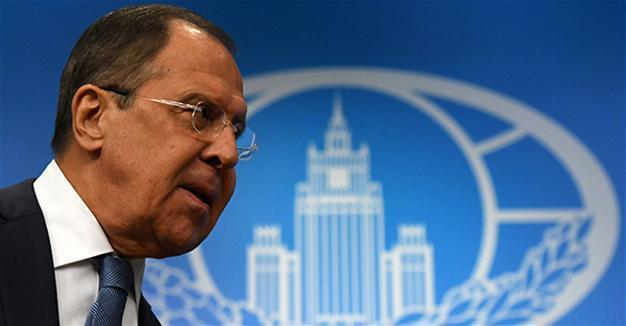Russia invites Trump officials to Syria talks, Lavrov says
MOSCOW

AFP photo
Russia’s Foreign Minister Sergei Lavrov said Jan. 17 that Moscow had invited representatives of the incoming U.S. administration to attend upcoming Syria talks in Kazakhstan.Lavrov said at a news conference on Jan. 17 that Russia is encouraged by U.S. President-elect Donald Trump’s focus on combating terrorism.
Lavrov said it was “right to invite representatives of the U.N. and the new U.S. administration” to the Astana talks, but did not say whether the incoming Trump administration had confirmed its attendance, according to AFP.
“We’re counting on the new [US] administration accepting this invitation and being represented by experts on any level they consider possible. It will be the first official contact during which we could begin discussing stepping up the efficiency of fighting terrorism in Syria,” Russia Today’s website quoted Lavrov as saying.
Organized by rebel backer Turkey and regime allies Russia and Iran, the peace talks scheduled to start on Jan. 23 in the Kazakh capital of Astana are the latest bid to put an end to the brutal war raging in Syria since March 2011.
Lavrov voiced hope that Russian and U.S. experts could start discussions on fighting terrorism in Syria, adding that Russia expected cooperation on settling the Syrian crisis to be more productive with the Trump administration than it was with the Obama administration, according to The Associated Press.
Lavrov also said that one of the goals of the Astana peace talks was to consolidate the frail truce in the war-torn country.
“One of the objectives of the meeting in Astana is first of all to consolidate the cease-fire,” AFP quoted Lavrov as saying.
Lavrov said that he had information that some European countries were considering wrecking Syria peace talks because they felt left out, adding that he hoped European countries would not make those attempts, according to Reuters.
Lavrov’s remarks came one day after he talked to his Turkish, Iranian and Kazakh counterparts, Mevlüt Çavuşoğlu, Javad Zarif and Kairat Abdrakhmanov, respectively, over the peace talks in Astana.
Meanwhile, on Jan. 17, Russia’s RIA news agency quoted Abdrakhmanov as saying that Kazakhstan is fully ready to hold talks on Syria in its capital on Jan. 23.
As discussions on who would attend the talks continued, Syria’s Al-Watan daily, which is close to the government, said that Syria’s U.N. ambassador would head the government delegation to upcoming peace talks, while chief rebel negotiator Mohammad Alloush, a leading figure in the Jaish al-Islam (Army of Islam) faction, would represent the opposition, according to National Coalition member Ahmad Ramadan, AFP reported.
The opposition delegation will include around 20 people, Ramadan told AFP.
ISIL began a fierce attack on Jan. 14, on the remaining parts of Deir ez-Zor under government control, and has managed to divide the city’s eastern half from the west.
It has also cut the supply route running from the city’s key military airport, limiting the government’s ability to bring in supplies and military reinforcements.
The monitor said Jan. 17 that three days of fighting had killed at least 116 people, among them 21 civilians, 37 members of regime forces and 58 ISIL fighters.
EU eyes UN-backed Syria conference in Brussels in April
Meanwhile, the European Union said it wanted to host a conference on the future of Syria this spring and was hoping that it can focus on rebuilding the war-torn country.
EU foreign policy chief Federica Mogherini said Jan. 16 that the preferred date for the meeting, to be held in tandem with the United Nations, would be in April, The Associated Press reported.
Mogherini said that the conference would come after the planned restart of the Geneva peace talks and “could be a moment for the international community to turn the page and start the reconstruction of Syria.”
The conference, to be held in Brussels, would also take stock of whether international donors are respecting their pledges to Syria.
















